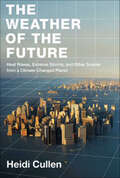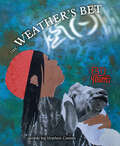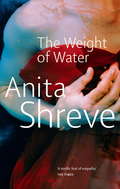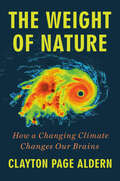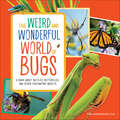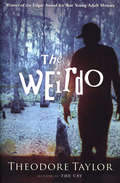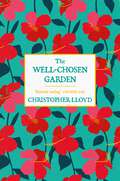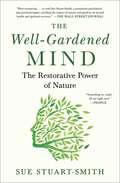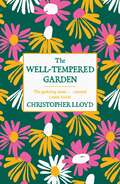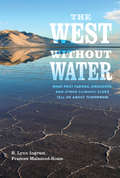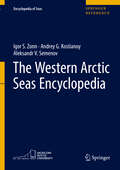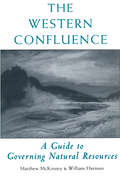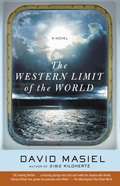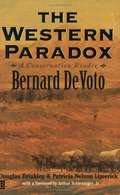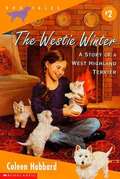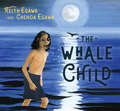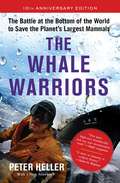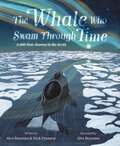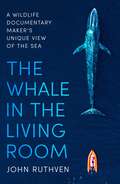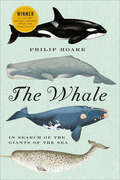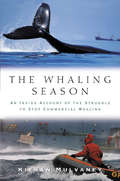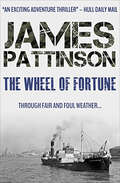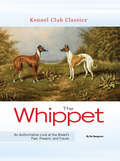- Table View
- List View
The Weather of the Future: Heat Waves, Extreme Storms, and Other Scenes from a Climate-Changed Planet
by Heidi Cullen“A scorching vision of what life might be like in the warmer world that is already on its way. " — Michiko Kakutani, New York Times“Vivid and compelling, this book shows what life will be like in a warming world. Essential reading for anyone who’s planning to inhabit the planet for the next few decades.” — Elizabeth Kolbert, author of Field Notes from a CatastropheFrom Heidi Cullen, one of America’s foremost experts on weather and climate change and a senior research scientist with Climate Central, a fascinating and provocative book that predicts what different parts of the world will look like in the year 2050 if current levels of carbon emissions are maintained.Dr. Heidi Cullen, one of the world’s foremost climatologists and environmental journalists, offers a new way of viewing the climate-change phenomenon, not as some future event but as something happening right now in our own backyard. In this groundbreaking, provocative work, Dr. Cullen combines the latest scientific research with state-of-the-art climate-model projections to create climate-change scenarios for seven of the most at-risk locations around the globe.From the Central Valley of California, where coming droughts will jeopardize the entire state’s water supply, to New York City, whose infrastructure is extremely vulnerable to even a relatively weak Category 3 hurricane, to Greenland, where warmer temperatures will give access to mineral wealth buried beneath ice sheets for millennia, Cullen illustrates how, if left unabated, climate change will transform every corner of the world by midcentury—and no two regions will be affected in quite the same way.
The Weather's Bet
by Ed Young*"Awe-inspiring artwork as powerful as any force of nature."--Kirkus Reviews (starred review)From Caldecott Medalist Ed Young comes a picture book retelling of Aesop's fable The Wind and the Sun. Once upon the sky, there were three powers--the Wind, the Rain, and the Sun--each claiming to be the mightier than the others. One day, the powers came upon a shepherd girl fast asleep upon a hill, so they made a bet to see who could make her take her cap off. Who will be the strongest of them all?Rendered in exquisite mixed-media collage, Caldecott Medalist Ed Young's gorgeous and deeply poignant retelling of the well-known Aesop's fable The Wind and the Sun, proves that sometimes gentle persuasion and kindness are the best virtues of all.Praise for The Weather's Bet:"Lyrical and profound." --School Library Journal"A good classroom readaloud."--Publishers Weekly
The Weight Of Water
by Anita ShreveOn Smuttynose Island, off the coast of New Hampshire, more than a century ago, two Norwegian immigrant women were brutally murdered. A third woman survived by hiding in a cave until dawn. In 1995, Jean, a photographer, is sent on an assignment to shoot a photo essay about the legendary crime. Taking her extended family with her, Jean stays in a sailboat anchored off the coast, and finds herself gradually becoming more and more engrossed in the bay's mysterious and gruesome past. Wandering into a library one day, she unearths letters written by Maren, the sole survivor of the murder spree. Jean's fear of losing all that she cares about is reflected in Maren's poignant tale of love and loss, and her obsession with the ancient story drives her to wild impulsive action -- with unrecoverable consequences.
The Weight of Nature: How a Changing Climate Changes Our Brains
by Clayton Page AldernA New York Times Editors' ChoiceA Next Big Idea Club and Sierra Magazine Must-Read BookA Behavioral Scientist&’s Summer Book List PickA Financial Times Best Summer BookA deeply reported, eye-opening book about climate change, our brains, and the weight of nature on us all. The march of climate change is stunning and vicious, with rising seas, extreme weather, and oppressive heat blanketing the globe. But its effects on our very brains constitute a public-health crisis that has gone largely unreported. Based on seven years of research, this book by the award-winning journalist and trained neuroscientist Clayton Page Aldern, synthesizes the emerging neuroscience, psychology, and behavioral economics of global warming and brain health. A masterpiece of literary journalism, this book shows readers how a changing environment is changing us today, from the inside out. Aldern calls it the weight of nature. Hotter temperatures make it harder to think clearly and problem-solve. They increase the chance of impulsive violence. Immigration judges are more likely to reject asylum applications on hotter days. Umpires, to miss calls. Air pollution, heatwaves, and hurricanes can warp and wear on memory, language, and sensory systems; wildfires seed PTSD. And climate-fueled ecosystem changes extend the reach of brain-disease carriers like mosquitos, brain-eating amoebas, and the bats that brought us the mental fog of long COVID. How we feel about climate change matters deeply; but this is a book about much more than climate anxiety. As Aldern richly details, it is about the profound, direct action of global warming on our brains and behavior—and the most startling portrait yet of unforeseen environmental influences on our minds. From farms in the San Joaquin Valley and public schools across the United States to communities in Norway&’s Arctic, the Micronesian islands, and the French Alps, this book is an unprecedented portrait of a global crisis we thought we understood.
The Weird and Wonderful World of Bugs: A Book About Beetles, Butterflies, and Other Fascinating Insects
by Rea ManderinoFascinating facts and up-close photos to delight bug fans ages 5 to 7Calling all young bug enthusiasts! Come along on a journey into The Weird and Wonderful World of Bugs. Kids from ages 5 to 7 will learn all about the insects and other arthropods we call "bugs." They'll meet moths, bees, fireflies, spiders, and mosquitos in detailed, full-color photos that bring the bugs to life from antennae to abdomen. Entomologist Rea Manderino, PhD, offers scientific facts on every page, inspiring budding bug scientists to explore their backyards with new eyes.Discover intriguing facts like:More than one-third of all the insects on Earth are beetles. There are almost 390,000 species!Some ants are farmers! They bring leaves back to the nest and use them to grow fungus, which they feed to their babies.Pillbugs are a type of crustacean—like crabs—with many legs, a hard exoskeleton, and gills that need water to breathe.Leap, fly, and crawl into a big world of small wonders with this incredible bug book for kids.
The Weirdo (Penguin Joint Venture Readers Ser.)
by Theodore TaylorChip Clewt, known simply as the weirdo, lives like a hermit in the Powhatan Swamp, a National Wildlife Refuge that is at the center of a heated controversy between local hunters and environmentalists. A hunting ban on the Powhatan is about to expire. The environmentalists want to protect the wildlife; the hunters are oiling their guns. Then someone completely unexpected comes forward to spearhead the conservation effort--the weirdo.Includes a reader's guide.
The Well-Chosen Garden
by Christopher LloydThe perfect book on how to make your garden the best it can be.'Essential reading' Country Life'Funny, encouraging, informative' Sunday TimesWould your garden, small or large, in town or country, win a prize? Is there room for improvement? Everybody has favourite plants, but the ability to put them all together to ensure a splendid show throughout the year is a skill that must be acquired. THE WELL-CHOSEN GARDEN will guide you to making the most of your available space, help you avoid untimely gaps, colour clashes and many other pitfalls of garden planning.The perfect book for new and experienced gardeners alike.
The Well-Chosen Garden
by Christopher LloydThe perfect book on how to make your garden the best it can be.'Essential reading' Country Life'Funny, encouraging, informative' Sunday TimesWould your garden, small or large, in town or country, win a prize? Is there room for improvement? Everybody has favourite plants, but the ability to put them all together to ensure a splendid show throughout the year is a skill that must be acquired. THE WELL-CHOSEN GARDEN will guide you to making the most of your available space, help you avoid untimely gaps, colour clashes and many other pitfalls of garden planning.The perfect book for new and experienced gardeners alike.
The Well-Gardened Mind: The Restorative Power of Nature
by Sue Stuart-SmithA distinguished psychiatrist and avid gardener offers an inspiring and consoling work about the healing effects of gardening and its ability to decrease stress and foster mental well-being in our everyday lives.The garden is often seen as a refuge, a place to forget worldly cares, removed from the &“real&” life that lies outside. But when we get our hands in the earth we connect with the cycle of life in nature through which destruction and decay are followed by regrowth and renewal. Gardening is one of the quintessential nurturing activities and yet we understand so little about it. The Well-Gardened Mind provides a new perspective on the power of gardening to change people&’s lives. Here, Sue Stuart-Smith investigates the many ways in which mind and garden can interact and explores how the process of tending a plot can be a way of sustaining an innermost self. Stuart-Smith&’s own love of gardening developed as she studied to become a psychoanalytic psychotherapist. From her grandfather&’s return from World War I to Freud&’s obsession with flowers to case histories with her own patients to progressive gardening programs in such places as Rikers Island prison in New York City, Stuart-Smith weaves thoughtful yet powerful examples to argue that gardening is much more important to our cognition than we think. Recent research is showing how green nature has direct antidepressant effects on humans. Essential and pragmatic, The Well-Gardened Mind is a book for gardeners and the perfect read for people seeking healthier mental lives.
The Well-Tempered Garden: A New Edition Of The Gardening Classic
by Christopher LloydA timeless gardening classic by Christopher Lloyd, one of Britain's most highly respected plantsmen, updated for the 21st century. With a new foreword by Anna Pavord.This is a classic work by a gardener who combines a passionate love of his subject with a critical intelligence and a good helping of wit. THE WELL-TEMPERED GARDEN is packed with the sort of information keen gardeners crave - from planting, weeding and the pleasures of propagation to annuals, water lilies and vegetables. Hailed as a masterpiece when it was first published, THE WELL-TEMPERED GARDEN is as fresh, enlightening and necessary for gardeners in the 21st century as it was when it first appeared more than 40 years ago.
The West without Water
by Frances Malamud-Roam B. Lynn IngramThe West without Water documents the tumultuous climate of the American West over twenty millennia, with tales of past droughts and deluges and predictions about the impacts of future climate change on water resources. Looking at the region's current water crisis from the perspective of its climate history, the authors ask the central question of what is "normal" climate for the West, and whether the relatively benign climate of the past century will continue into the future. The West without Water merges climate and paleoclimate research from a wide variety of sources as it introduces readers to key discoveries in cracking the secrets of the region's climatic past. It demonstrates that extended droughts and catastrophic floods have plagued the West with regularity over the past two millennia and recounts the most disastrous flood in the history of California and the West, which occurred in 1861-62. The authors show that, while the West may have temporarily buffered itself from such harsh climatic swings by creating artificial environments and human landscapes, our modern civilization may be ill-prepared for the future climate changes that are predicted to beset the region. They warn that it is time to face the realities of the past and prepare for a future in which fresh water may be less reliable.
The Western Arctic Seas Encyclopedia
by Andrey G. Kostianoy Igor S. Zonn Aleksandr V. SemenovThis Encyclopedia is designed to accumulate and systematize our knowledge about the unique natural water areas - the Barents, White and Kara seas, their wealth, the events that took place on its waters and shores, and the remarkable people whose lives were and are closely intertwined with the seas. The Encyclopedia contains about 900 terms and concepts related to the seas. It describes geographical features: rivers, lakes, straits, bays; provides information about towns, seaports, transport communications, basic aquatic biological species, nature reserves, national and international programs for the study of the sea, research institutes, historical monuments, activities of prominent explorers and travelers, researchers and scientists. The Encyclopedia includes a chronology of major historical events connected with the Western Arctic seas for more than 1200 years.
The Western Confluence: A Guide To Governing Natural Resources
by Charles F. Wilkinson Will Harmon Matthew MckinneyFor 150 years, the American West has been shaped by persistent conflicts over natural resources. This has given rise to a succession of strategies for resolving disputes-prior appropriation, scientific management, public participation, citizen ballot initiatives, public interest litigation, devolution, and interest-based negotiation. All of these strategies are still in play, yet the West remains mired in gridlock. In fact, these strategies are themselves a source of conflict.The Western Confluence is designed to help us navigate through the gridlock by reframing natural resource disputes and the strategies for resolving them. In it, authors Matthew McKinney and William Harmon trace the principles of natural resource governance across the history of western settlement and reveal how they have met at the beginning of the twenty-first century to create a turbid, often contentious confluence of laws, regulations, and policies. They also offer practical suggestions for resolving current and future disputes. Ultimately, Matthew McKinney and William Harmon argue, fully integrating the values of interest-based negotiation into the briar patch of existing public decision making strategies is the best way to foster livable communities, vibrant economies, and healthy landscapes in the West.Relying on the authors' first-hand experience and compelling case studies, The Western Confluence offers useful information and insight for anyone involved with public decision making, as well as for professionals, faculty, and students in natural resource management and environmental studies, conflict management, environmental management, and environmental policy.
The Western Limit of the World
by David MasielDavid Masiel's first novel, 2182 Kilohertz, was one of the most greatly praised books of 2002. A riveting adventure of an unlikely hero's quest for personal redemption in frigid arctic waters, it earned its author comparisons to such giants of nautical fiction as Melville and Conrad. Now Masiel more than meets the promise of his debut with a harrowing odyssey of love and betrayal on the high seas-and in the shadowy corners of the human heart.
The Western Paradox: A Conservation Reader
by Arthur M. Schlesinger Bernard Devoto Douglas Brinkley Patricia NelsonThis book is the fascinating record of DeVoto's crusade to save the West from itself.
The Westie Winter: A Story of a West Highland Terrier (Dog Tales #2)
by Coleen Hubbard[From the back cover:] Who could say no to a puppy? Every Christmas, Kelly asks her parents for a puppy. But she never gets one. This year Kelly has a great idea. She'll get a puppy for somebody who loves dogs as much as she does -- her Grandpa Dunc, who has just moved in with Kelly's family. Kelly meets a breeder and picks the perfect puppy on her own. But suddenly Grandpa Dune starts acting strange. Could the puppy present be all wrong? Book jacket. If you love dogs, Bookshare has more books in the Dog Tales series for you. Check out #1 The Golden Year: A Story of a Golden Retriever, #3 Mountain Dog Rescue: A Story of a Bernese Mountain Dog, and #4 The Great Spaniel Escape.
The Whale Child
by Keith Egawa Chenoa EgawaAn inspiring middle-grade chapter book that introduces young readers to the environmental challenges facing the planet through the eyes of Coast Salish characters and authors."You have family on land as you do in the sea. . . being a caretaker of the earth begins with taking care of the water that all life depends on."Shiny is a whale child. One day his mother teaches him about the harm facing the world's oceans because of human carelessness. Shiny agrees to be turned into a boy by the ocean's water spirit so he can visit the land and alert people to these dangers. He meets Alex, a young Coast Salish girl who learns from Shiny that the living spirit of water exists in everything--glaciers, rivers, oceans, rain, plants, and all living creatures. Together the two travel the earth, confronting the realities of a planet threatened by an uncertain future. Inspired by Shiny's hope, humor, and wisdom, Alex makes the promise to become a teacher for future generations. She realizes that the timeless Indigenous value of environmental stewardship is needed now more than ever and that we must all stand up on behalf of Mother Earth. Written and illustrated by Indigenous authors Keith Egawa and Chenoa Egawa, The Whale Child introduces children ages 7 to 12 to existing environmental issues with a message of hope, education, sharing, and action. Ideal for middle-grade readers who are beginning to read chapter books on their own, this book also includes resources for students and teachers to facilitate learning about Pacific Northwest Indigenous cultures and the environment.
The Whale Warriors
by Peter HellerFor the crew of the eco-pirate ship the Farley Mowat, any day saving a whale is a good day to die. In The Whale Warriors, veteran adventure writer Peter Heller takes us on a hair-raising journey with a vigilante crew on their mission to stop illegal Japanese whaling in the stormy, remote seas off the forbidding shores of Antarctica. The Farley is the flagship of the Sea Shepherd Conservation Society and captained by its founder, the radical environmental enforcer Paul Watson. The Japanese, who are hunting endangered whales in the Southern Ocean Whale Sanctuary, in violation of several international laws, know he means business: Watson has sunk eight whaling ships to the bottom of the sea. For two months, Heller was aboard the vegan attack vessel as it stalked the Japanese whaling fleet through the howling gales and treacherous ice off the pristine Antarctic coast. The ship is all black, flies under a Jolly Roger, and is outfitted with a helicopter, fast assault Zodiacs, and a seven-foot blade attached to the bow, called the can opener. As Watson and his crew see it, the plight of the whales is also about the larger crisis of the oceans and the eleventh hour of life as we know it on Earth. The exploitation of endangered whales is emblematic of a terrible overexploitation of the seas that is now entering its desperate denouement. The oceans may be easy to ignore because they are literally under the surface, but scientists believe that the world's oceans are on the verge of total ecosystem collapse. Our own survival is in the balance. With Force 8 gales, monstrous seas, and a crew composed of professional gamblers, Earthfirst! forest activists, champion equestrians, and ex-military, the action never stops. In the ice-choked water a swimmer has minutes to live. The Japanese factory ship is ten times the tonnage of the Farley. The sailors on board both ships know that there will be no rescue in this desolate part of the ocean. Watson presses his enemy while Japan threatens to send down defense aircraft and warships, Australia appeals for calm, New Zealand dispatches military surveillance aircraft, the U.S. Office of Naval Intelligence issues a piracy warning, and international media begin to track the developing whale war. For the Sea Shepherds there is no compromise. If the charismatic, intelligent Great Whales cannot be saved, there is no hope for the rest of the planet. Watson aims his ship like a slow torpedo and gives the order: "Tell the crew, collision in two minutes." In 35-foot seas, it is a deadly game of Antarctic chicken in which the stakes cannot be higher.
The Whale Who Swam Through Time: A Two-Hundred-Year Journey in the Arctic
by Nick Pyenson Alex BoersmaThis sweeping nonfiction picture book The Whale Who Swam Through Time explores the 200-year lifespan of a bowhead whale and the changing environment that surrounds her.Almost 200 years ago . . .Our journey begins with the birth of a bowhead whale, the longest-living mammal in the world. Over the course of her life in the Arctic, the bowhead whale witnesses many changes: from an era of peace and solitude to one of oil rigs and cruise liners.With gorgeous, detailed, and striking illustrations, this well researched and thoughtfully curated nonfiction story captures the magic and beauty of the natural world, while also providing a thoughtful account of how humans have impacted our changing ecosystems and a call-to-action for protecting the environment.
The Whale in the Living Room
by John RuthvenThe Whale in the Living Room follows the thrilling adventures of award-winning wildlife documentary producer, John Ruthven, on a journey of discovery - by turns memorable, touching and often funny -that has helped the undersea world flow into countless living rooms to reveal many of our ocean's mysteries.John is the only producer to have worked on both Blue Planet and Blue Planet II, presented by David Attenborough, in total making nearly fifty ocean films, including episodes of Discovery Shark Week, expedition films for National Geographic and coral conservation documentaries for PBS. With innovative technology he has helped capture unique images of a sperm whale mother and calf, pictures of glowing creatures half a mile deep, and grey reef sharks hunting by the light of the moon. We swim with him through blue lagoons, dive into the abyss to encounter new life forms, and experience everything from the danger of getting lost at sea to the sadness of finding a starving whale with a fishing net caught in its mouth. Through each remarkable adventure, John gives insight into what we currently know about the ocean, and our whole blue planet, revealing that the sea really is the 'saltwater country' the Yolngu people of Australia know it to be - a place with as many unique destinations in water as on land.John's book also explores why we have remained largely blind to the pollution in our oceans until recently and charts how plastic 'went wild' in the sea, to understand how we might begin to clear up the mess.
The Whale in the Living Room: A Wildlife Documentary Maker's Unique View of the Sea
by John RuthvenThe Whale in the Living Room follows the thrilling adventures of award-winning wildlife documentary producer, John Ruthven, on a journey of discovery - by turns memorable, touching and often funny -that has helped the undersea world flow into countless living rooms to reveal many of our ocean's mysteries.John is the only producer to have worked on both Blue Planet and Blue Planet II, presented by David Attenborough, in total making nearly fifty ocean films, including episodes of Discovery Shark Week, expedition films for National Geographic and coral conservation documentaries for PBS. With innovative technology he has helped capture unique images of a sperm whale mother and calf, pictures of glowing creatures half a mile deep, and grey reef sharks hunting by the light of the moon. We swim with him through blue lagoons, dive into the abyss to encounter new life forms, and experience everything from the danger of getting lost at sea to the sadness of finding a starving whale with a fishing net caught in its mouth. Through each remarkable adventure, John gives insight into what we currently know about the ocean, and our whole blue planet, revealing that the sea really is the 'saltwater country' the Yolngu people of Australia know it to be - a place with as many unique destinations in water as on land.John's book also explores why we have remained largely blind to the pollution in our oceans until recently and charts how plastic 'went wild' in the sea, to understand how we might begin to clear up the mess.
The Whale: In Search of the Giants of the Sea
by Philip HoareA travelogue through the history, literature, and lore of the remarkable mammals that we long have been fascinated with, from Moby-Dick to Free Willy.From his childhood fascination with the gigantic Natural History Museum model of a blue whale, to his abiding love of Moby-Dick, to his adult encounters with the living animals in the Atlantic Ocean, the acclaimed writer Philip Hoare has been obsessed with whales. The Whale is his unforgettable and moving attempt to explain why these strange and beautiful animals exert such a powerful hold on our imagination.Praise for The WhaleWinner of the Samuel Johnson Prize for Non-Fiction“This tour de force is a sensuous biography of the great mammals that range on and under Earth’s oceans.” —Publishers Weekly, starred review“The Whale is part cultural study, part travelogue, as Hoare traces the footsteps of Herman Melville from New York to New Bedford and Nantucket . . . [and] digresses on our abuses of the whale and the devastations of the whaling industry.” —Boston Globe“One of the most sublime reading experiences you’ll have this year.” —NPR’S All Things Considered
The Whaling Season: An Inside Account Of The Struggle To Stop Commercial Whaling
by Kieran MulvaneyDespite a decades-long international moratorium on commercial whaling, one fleet has continued to hunt and kill whales in the waters surrounding Antarctica. Refusing to let this defiance go unchallenged, the environmental organization Greenpeace began dispatching expeditions to the region in an effort to intercept the whalers and use nonviolent means to stop their lethal practice.Over the past decade, Kieran Mulvaney led four such expeditions as a campaigner and coordinator. In The Whaling Season, he recounts those voyages in all their drama, disappointments, strain, and elation, giving readers a behind-the-scenes look at the hazards and triumphs of life as an environmental activist on the high seas. The author also explores the larger struggles underlying the expeditions, drawing on the history of commercial whaling and Antarctic exploration, the development of Greenpeace, and broader scientific and political efforts to conserve marine life. He presents a rich portrait of the current struggles and makes an impassioned plea for protection of some of the world's most spectacular creatures.For armchair adventurers, polar enthusiasts, and anyone concerned about marine conservation and continued hunting of the world's whales, The Whaling Season is an engrossing and informative tale of adventure set in one of the Earth's last great wilderness areas."
The Wheel of Fortune (Ulverscroft Large Print Ser.)
by James PattinsonA banker heeds the call of the sea and joins the crew of an ocean steamer in this “exciting adventure thriller” from the author of The Deadly Shore (Hull Daily Mail). John Baxter is not truly a seaman. Having served on a destroyer during the war, he went back to work with his father at the bank. But no longer content with the daily office grind, John sets out to find work on the open ocean. Leaving behind his wife, Constance, and his job, he sets sail on the Wheel of Fortune. Bunking with an experienced seaman named Laratee, John soon discovers the man’s dark past. Not only does Laratee look strange, but he also drinks—heavily—to forget the many skeletons in his closet. But soon, it isn’t just their own personal demons John and Laratee must battle, but the volatile nature of the open ocean, where no-one is safe . . .
The Whippet
by Bo BengtsonFifth in the Kennel Club Classics breed series, The Whippet, written by renowned Whippet breeder, judge and historian Bo Bengtson, is the bible on the Whippet, one of the world's most popular and beloved purebred dogs. This book's detailed chapters on everything from the history of the breed to the breed's accomplishments in dog shows around world to the Whippet's participation in racing and coursing events make it the most important and beautiful book ever published on the Whippet. With hundreds of vintage and modern photographs, this book is a must-have for every whippet owner.
